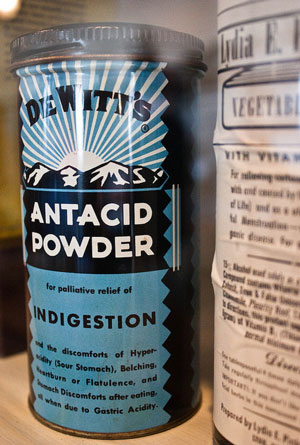The stomach is adapted to be able to cope with acid, so if your diet is normal and you are healthy, you shouldn’t feel any burning sensation in your stomach. However, many people have, at some time in their life, experienced acid reflux or ‘heartburn’ – that burning feeling in the throat or chest that is caused by stomach acid rising up out of the stomach and into the esophagus, which is not adapted to having acid around. What causes stomach acid to rise up into your throat like this?
Excess stomach acid
 There are many reasons why your body might start to secrete more stomach acid than usual and cause heartburn. Certain foods and drinks can trigger this, especially when consumed to excess, including alcohol, caffeine, spicy foods, acidic foods and even chocolate. Some medications can also contribute to excess stomach acid, most notably the common painkiller ibuprofen – which is why you should never take ibuprofen on an empty stomach.
There are many reasons why your body might start to secrete more stomach acid than usual and cause heartburn. Certain foods and drinks can trigger this, especially when consumed to excess, including alcohol, caffeine, spicy foods, acidic foods and even chocolate. Some medications can also contribute to excess stomach acid, most notably the common painkiller ibuprofen – which is why you should never take ibuprofen on an empty stomach.
Smoking
The lower esophageal sphincter (LES) is a muscle that tightens to contain swallowed food within the stomach so that the stomach acid can get to work. Certain chemicals can cause this sphincter muscle to relax, thus allowing acid from the stomach to work its way back into the esophagus. The nicotine in tobacco is one chemical that can relax the LES.
Obesity
Being obese can put excess pressure on your abdomen, which in turn can cause stomach acid to reflux into the chest. Even if you are not overweight, the same effect can be caused simply by eating an excessively large meal.
Pregnancy
Many women experience heartburn during pregnancy, since the developing baby can push upwards into your stomach and force some acid up into your chest.
Others
There are many other causes of heartburn including more serious conditions such as stomach ulcers and cancers, or even something as simple as lying down shortly after eating, or wearing tightly fitting clothes. If you have heartburn, what can be done about it?
Antacids: How do they work?
Antacids work based on a very simple principle of basic chemistry:
Acid + Alkali = Salt + Water
When you add an equal amount and strength of an acid substance to an alkali substance, the resulting chemical reaction turns the acid and alkali into salt and water. Both acids and alkalis are corrosive, but salt and water are, of course, harmless substances.
Antacids are alkaline substances. When you swallow or chew an antacid tablet, the alkali reacts with the stomach acid in your throat and turns into simple water and salt, thus relieving the burning pain that you feel when you have heartburn. It’s really that simple!
If you occasionally get heartburn after a heavy night or a large meal, antacids are easy and effective way to neutralise your excess stomach acid and carry on with your day. If you regularly get heartburn however, you might want to visit your GP to make sure that there is not a more serious cause of the excess stomach acid.



